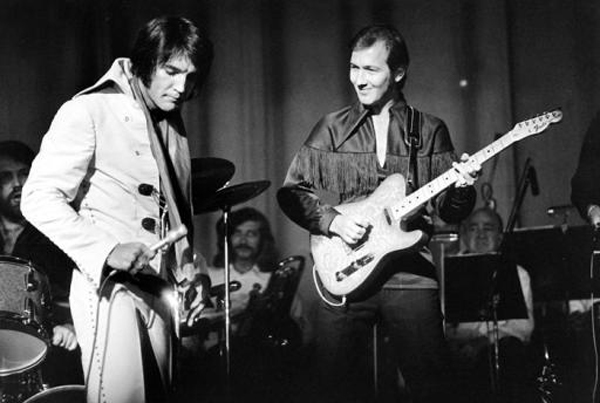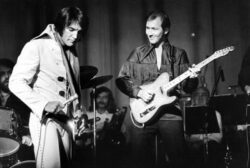James Burton
James Burton (born August 21, 1939) is one of the most highly respected and prolific guitarists in contemporary popular music.

Courtesy of The James Burton Foundation
James Burton and Elvis Presley. Unidentified
James Burton (born August 21, 1939) is one of the most highly respected and prolific guitarists in contemporary popular music. Born in the small town of Dubberly, Louisiana, Burton began playing at age thirteen. A year later he was proficient enough to perform in bars and nightclubs around Shreveport. These jobs led to an invitation to join the house band of the Louisiana Hayride. This weekly live radio show, comparable to Nashville’s Grand Ole Opry, reached a broad audience and was one of America’s preeminent country music programs for twelve years. Louisiana Hayride helped launch the careers of Elvis Presley, Johnny Cash, Webb Pierce, Hank Williams, George Jones, and Johnny Horton. James Burton played behind the latter two, and many other Hayride stars as well.
Burton’s talents, however, were not limited to country music. Equally adept in the related fields of blues and rock, Burton’s sound is a synthesis of all three genres. At age eighteen, Burton laid down a classic, bluesy solo on Dale Hawkins’s “Suzie Q,” the first of many hit records that succeeded thanks to Burton’s accompaniment. His next high-profile job took place in Los Angeles, California, when Burton (still a teen himself) became the lead guitarist for teen pop star Ricky Nelson. Burton based his trademark sound on complex, fleet-fingered single note runs, which was an electrification of old-time country finger-picking sometimes referred to as “chicken pickin’” that he made sound effortless. Burton achieved this effect, in part, by using especially thin guitar strings. The style complemented Nelson’s 1961 hits “Traveling Man” and “Hello, Mary Lou,” and Burton’s instantly recognizable solos established him as a highly sought-after session guitarist. As The Beatles’ George Harrison told Guitar Player magazine, “Those early sounds that we did, I just hated them. They sounded so puny. I mean, listening to James Burton playing on the Rick Nelson records… and we would come up with our stuff that was so feeble.”
During the next thirty-plus years, Burton recorded with innumerable prominent musicians, sometimes playing six sessions a day. His remarkably diverse recording resume spans from country, rock, pop, and gospel to jazz, contemporary folk, and cartoon soundtracks. A select sampling includes The Monkees’ Instant Replay; Buffalo Springfield’s Buffalo Springfield Again; Dean Martin’s Lay Some Happiness On Me; nineteen Elvis Presley albums, encompassing rock, country, and gospel; Elvis Costello’s Out of Our Idiot and Mighty Like a Rose; Emmylou Harris’s 1970s classics Elite Hotel, Pieces of the Sky, and Luxury Liner; Joni Mitchell’s For The Roses; Judy Collins’s Who Knows Where The Time Goes; Rodney Crowell’s Ain’t Livin’ Long Like This (featuring the original version of “Leaving Louisiana in the Broad Daylight”); Cajun fiddler Doug Kershaw’s Spanish Moss; Rockin’ My Life Away, The Palomino Club Recordings; seven other albums by Jerry Lee Lewis; Spongebob Squarepants’s The Best Day Ever; Johnny 99 by Johnny Cash; Nat King Cole’s I Don’t Want To Be Hurt Anymore; Neil Young’s Lucky Thirteen; nine Merle Haggard albums; and Pat Boone’s Ready To Rock.
Burton was equally in demand as a live performer, when he could be coaxed away from lucrative studio work. In 1965 he put together the house band known as The Shindogs for the popular television show Shindig. In 1969, while Burton was touring with Frank Sinatra, Elvis Presley tapped him to assemble and lead his band for the career comeback engagement in Las Vegas that was a universally acclaimed success. Recalling his performances with Presley, Burton said, “We just kicked back, relaxed, and enjoyed our time together.” In 1987, Burton led the band for an HBO special honoring Roy Orbison, accompanying Orbison and such special guests as Bruce Springsteen, Tom Waits, and Jackson Browne.
Burton’s career covers an improbably eclectic cross-section of popular music. He reached this high professional level because he always took the role of a dedicated accompanist who showcased the featured performance of the artist at hand. He does not sing and has recorded only two albums as an instrumental soloist. In the years following his long stint with Presley, Burton toured with Emmylou Harris, Jerry Lee Lewis, John Denver, and Elvis Costello, and performed as leader of his own band. His appearances in Louisiana include the New Orleans Jazz & Heritage Festival and the Ponderosa Stomp, as well as at his own Shreveport nightclub (now closed), James Burton’s Rock and Roll Café. In 2007, Burton was presented with a Lifetime Achievement Award by the Louisiana Division of the Arts, at the Governor’s Arts Awards ceremony at the Old State Capitol Building in Baton Rouge.
Burton’s vast body of work led the Fender guitar company to create several special instruments in his honor and to welcome him into the Fender Hall of Fame. He is also a Grammy winner, an inductee into the Rock and Roll Hall of Fame, and one of Rolling Stone’s Top 100 Guitarists of All Time. Upon moving back to Shreveport, he created the James Burton Foundation to make instruments and tuition available to students and aspiring musicians. This cause is funded by his annual summer extravaganza, The James Burton International Guitar Festival, an assemblage of Burton’s best and brightest peers. A statue of Burton now stands in front of Shreveport’s Municipal Auditorium, where this great guitarist first made his name.
